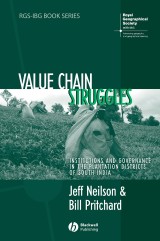Details

Value Chain Struggles
Institutions and Governance in the Plantation Districts of South IndiaRGS-IBG Book Series 1. Aufl.
|
CHF 71.00 |
|
| Verlag: | Wiley-Blackwell |
| Format: | |
| Veröffentl.: | 23.03.2009 |
| ISBN/EAN: | 9781444308730 |
| Sprache: | englisch |
| Anzahl Seiten: | 320 |
DRM-geschütztes eBook, Sie benötigen z.B. Adobe Digital Editions und eine Adobe ID zum Lesen.
Beschreibungen
Adopting a 'global value chain' approach, <i>Value Chain Struggles</i> investigates the impact of new trading arrangements in the coffee and tea sectors on the lives and in the communities of growers in South India. <ul> <li>Offers a timely analysis of the social hardships of tea and coffee producers</li> <li>Takes the reader into the lives of growers in Southern India who are struggling with issues of value chain restructuring</li> <li>Reveals the ways that the restructuring triggers a series of political and economic struggles across a range of economic, social, and environmental arenas</li> <li>Puts into perspective claims about the impacts of recent changes to global trading relations on rural producers in developing countries</li> </ul>
<p>List of Figures vi</p> <p>List of Tables viii</p> <p>Series Editors’ Preface x</p> <p>Acknowledgements xi</p> <p>List of Abbreviations xiii</p> <p>1 Introduction 1</p> <p>2 Re-inserting Place and Institutions within Global Value Chain Analysis 27</p> <p>3 How to Make a (South Indian) Cup of Tea or Coffee 66</p> <p>4 The Institutional Environment of the South Indian Tea and Coffee Industries 107</p> <p>5 Struggles over Labour and Livelihoods 130</p> <p>6 Struggles over Environmental Governance in the Coffee Forests of Kodagu 162</p> <p>7 Smallholder Engagement in Global Value Chains: Initiatives in the Nilgiris 186</p> <p>8 Making a Living in the Global Economy: Institutional Environments and Value Chain Upgrading 210</p> <p>9 Conclusion: What We Brewed 230</p> <p>Appendix A: The Role of Managing Agents 240</p> <p>Appendix B: The Operation and Intended</p> <p>Reform of South India’s Tea Auctions 241</p> <p>Appendix C: Restructuring of Tata Tea’s Munnar Operations 246</p> <p>Notes 248</p> <p>Bibliography 263</p> <p>Index 291</p>
<b>Jeff Neilson</b> maintains primary research interests in rural development and environmental issues across various Asian countries. He completed his PhD with a study of the Indonesian coffee industry, has authored twelve refereed publications, and has worked as a consultant to various international development agencies. Dr Neilson is currently employed as a post-doctoral research fellow in geography at the University of Sydney, Australia. <p><b>Bill Pritchard</b> is an Economic Geographer whose research has focused on global change in agriculture, food and rural places. He has authored two books, edited four others, and written more than forty refereed publications. He is an active member and former convener of the Australia & New Zealand Agri-Food Research Network, a member of the Australian Research Council Research Network on Spatially Integrated Social Sciences, and Steering Committee Member of the International Geographical Union Commission on the Dynamics of Economic Spaces.</p>
There is no question that trouble is brewing for millions of coffee and tea producers worldwide. Over the past decade, the playing field has shifted as international prices have crashed and buyers have laid down extensive new requirements for market access. <i>Value Chain Struggles</i> gets to the roots of these important issues by investigating the impact of new trading arrangements in the coffee and tea sectors on the lives of struggling growers in <st1:place w:st="on">South India</st1:place>. Adopting a ‘global value chain’ approach – one that links production, trade and consumption – we see the net effect this restructuring is having on the people, communities and environment in this fertile region of the world. <p/> Like a caffeinated jolt, <i>Value Chain Struggles: Institutions and Governance in the Plantation Districts of South India</i> opens our eyes to the devastating impact of recent changes to global trading relations on rural producers in the world's developing countries.
"Extremely well written, clearly argued and nicely illustrated, this book offers a wonderfully detailed case study of tea and coffee cultivation in South India - in all its multi-scalar institutional and regulatory contexts - and yet also speaks powerfully to a variety of wider theoretical issues concerning global value chains, global private regulation, and ethical and sustainable production schemes."<br /> <b><i>–</i>Neil Coe,</b> University of Manchester <p>"This book gets to the roots of new trading arrangements in the coffee and tea sectors which affect the lives of struggling growers in South India. Adoption of a meaningful global value chain approach that links production, trade and consumption is the unique feature of this book. Arrays of issues including history, geography, politics and culture at local, regional and national levels have been covered. It is certainly a valuable, scholarly and policy contribution."<br /> <b><i>–</i>P. G. Chengappa,</b> Vice Chancellor, University of Agricultural Sciences, Bangalore, India</p>
Diese Produkte könnten Sie auch interessieren:

Observing Systems for Atmospheric Composition

von: Guido Visconti, Pietro Di Carlo, W. Brune, M. Schoeberl, Andreas Wahner

CHF 177.00















